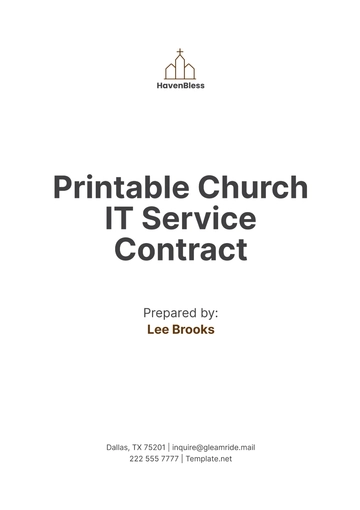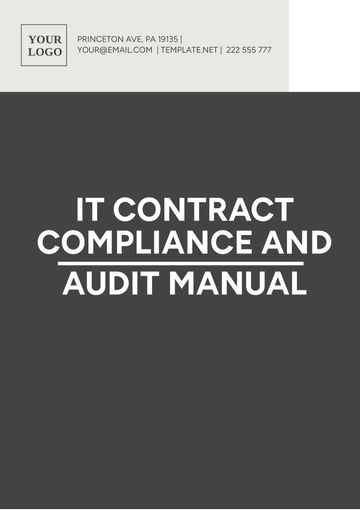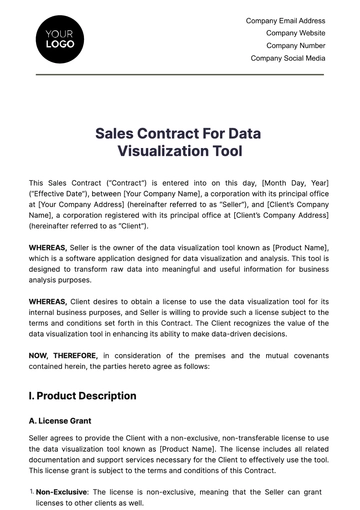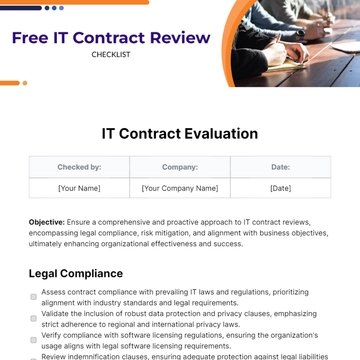Free Printable Church IT Service Contract
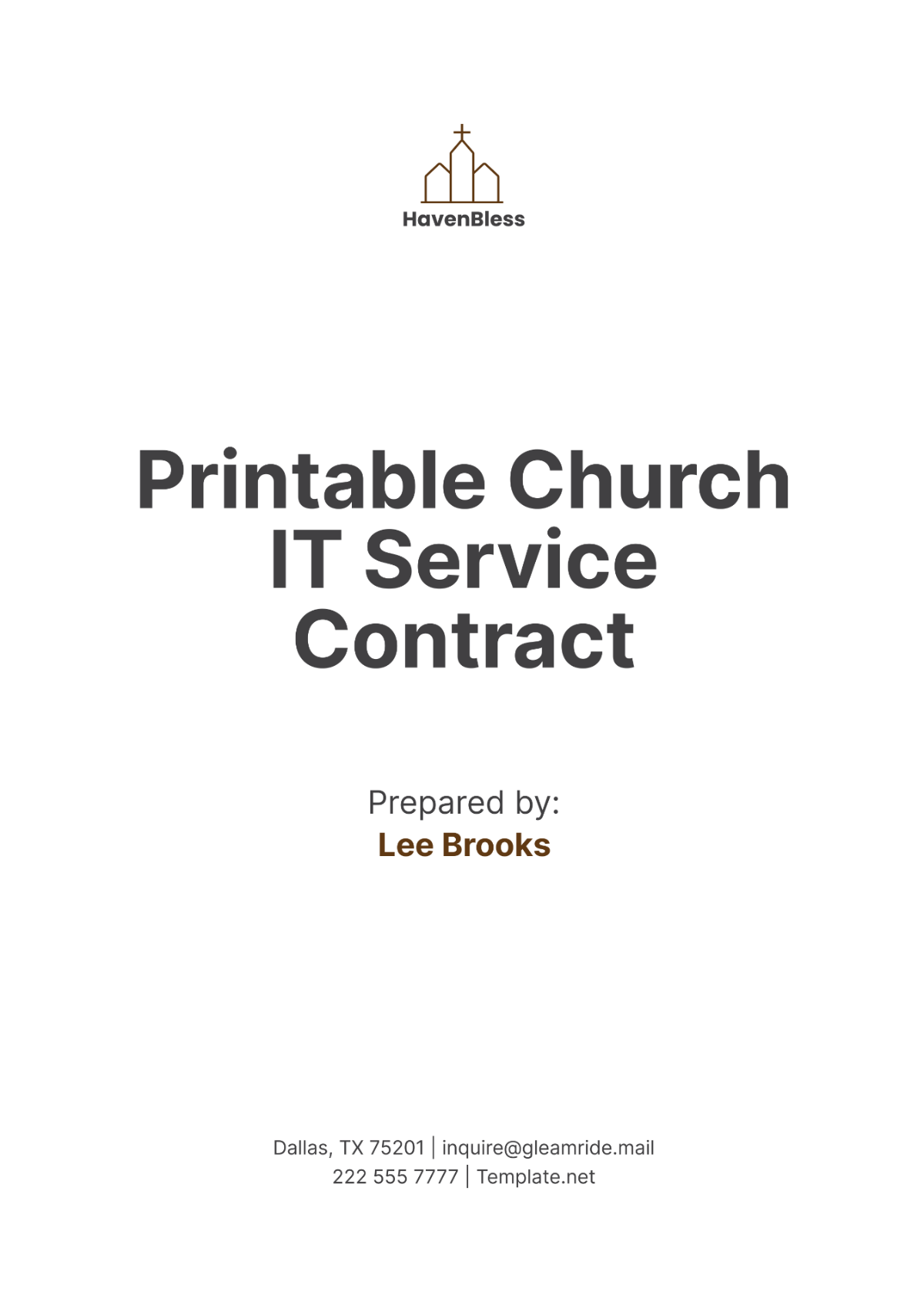
I. The Parties
This Church IT Service Contract ("Contract") is made and entered into on [Month Day, Year] by and between [Your Company Name], a religious organization ("Church"), with a primary place of business at [Your Company Address], and [Service Provider’s Name], an IT service provider ("Service Provider"), with a primary place of business at [Service Provider’s Address]. The Church and Service Provider may collectively be referred to as the ("Parties") or individually as a ("Party").
WHEREAS, the Church requires professional IT services to support its operations;
WHEREAS, the Service Provider is an experienced IT service provider qualified to deliver such services;
WHEREAS, both Parties desire to establish an arrangement for the provision of IT services according to the terms set forth in this Contract;
NOW THEREFORE, in consideration of the mutual covenants herein contained, the Parties agree as follows:
II. Services Provided
A. Scope of Services
Hardware and Software Maintenance: The Service Provider shall provide IT support services including the maintenance of hardware and software to ensure all systems are operational and up to date. This will involve regular checks, troubleshooting, and repairs to prevent any disruptions.
Network Security and Data Protection: The Service Provider shall ensure robust network security and data protection measures are in place to safeguard the Church's digital assets. This includes implementing firewalls, encryption, and regular security audits.
System Updates and Backups: The Service Provider shall perform regular system updates and backups to maintain the integrity and functionality of IT systems. This will help prevent data loss and keep software applications running smoothly.
Technical Support: The Service Provider shall offer technical support during regular business hours to address any IT issues promptly. This ensures that the Church’s operations can continue without significant interruptions.
Emergency Support: The Service Provider shall provide emergency support outside of regular business hours as needed to resolve critical issues. This guarantees that urgent problems are addressed immediately to minimize downtime.
B. Service Levels
Response Time: The Service Provider shall respond to IT support requests within [4] business hours, ensuring timely attention to issues. This quick response helps mitigate the impact of IT problems on Church operations.
Issue Resolution: The Service Provider shall aim to resolve issues within [24] hours from the time of the initial request, maintaining a high standard of service. Rapid resolution ensures minimal disruption to the Church's activities.
Network Uptime: The Service Provider shall ensure [99]% network uptime each month, minimizing downtime and disruptions. High network availability is crucial for the Church's communication and administrative functions.
Monthly Reports: The Service Provider shall provide monthly reports on IT system performance and issues resolved, offering transparency and accountability. These reports will help the Church monitor IT health and plan for future needs.
C. Exclusions
Non-compliance: The Service Provider shall not be responsible for issues caused by the Church's failure to follow recommendations provided by the Service Provider. Adherence to guidelines is essential for optimal IT system performance.
External Factors: The Service Provider shall not be liable for IT issues outside of its control, such as those caused by natural disasters or other external factors. This clause recognizes the limitations of the Service Provider’s ability to control certain events.
Third-Party Failures: The Service Provider shall not cover the costs associated with third-party software or hardware failures, which are beyond its direct control. The Church will be responsible for addressing these external failures.
III. Compensation
A. Hourly Rate
Service Rate: The Church agrees to pay the Service Provider a rate of [$80] per hour for services rendered, ensuring fair compensation for work performed. This rate covers all standard IT services provided by the Service Provider.
Invoicing: The Service Provider shall invoice the Church on a [monthly] basis for hours worked during the previous month, providing a clear record of services rendered. This helps both parties track services and manage budgets effectively.
Payment Terms: Payments are due within [15] days of receipt of the invoice, ensuring timely payment for services provided. Prompt payment ensures continued and uninterrupted IT support.
B. Additional Costs
Reimbursement of Costs: The Church shall reimburse the Service Provider for any pre-approved additional costs incurred, such as the purchase of hardware or specialized software necessary for service delivery. These additional costs will be clearly documented and justified.
Documentation: Such costs must be accompanied by receipts or documentation justifying the expenses, ensuring transparency and accountability in financial transactions. Proper documentation helps prevent any misunderstandings regarding expenses.
IV. Term and Termination
A. Contract Term
Initial Term: This Contract shall commence on the Effective Date and continue for a period of [1] year, establishing a clear timeline for service provision. This initial term sets the foundation for the working relationship.
Renewal: The Contract shall automatically renew for successive [one]-year terms unless either Party provides a [30]-day written notice of termination, ensuring continuity or allowing for planned cessation. Automatic renewal simplifies the continuation of services.
B. Termination for Cause
Breach of Obligations: Either Party may terminate this Contract for cause if the other Party fails to perform its obligations under this Contract, ensuring accountability. A breach must be clearly defined and documented.
Notice and Remedy: The terminating Party must provide a written notice specifying the breach and allow [15] days for the other Party to remedy the breach, offering a chance for correction. This process helps prevent abrupt terminations and allows for dispute resolution.
C. Termination Without Cause
Notice Period: Either Party may terminate this Contract without cause by providing a [60]-day written notice to the other Party, allowing for orderly termination. This notice period ensures both parties have adequate time to prepare for the termination.
Payment for Services Rendered: Upon such termination, the Church shall pay the Service Provider for all services rendered up to the date of termination, ensuring fair compensation. This payment covers all work performed until the termination date.
V. Confidentiality
A. Confidential Information
Information Protection: Both Parties agree to keep confidential all information received from the other Party, protecting sensitive data. Confidential information includes but is not limited to Church financial data, member information, and internal communications.
Definition of Confidential Information: This obligation shall survive the termination of this Contract, ensuring continued protection of confidential information. Both parties must handle confidential information with the utmost care.
B. Disclosure
Written Consent: Disclosure of confidential information is permitted only with written consent from the other Party, ensuring mutual agreement. Both parties must agree in writing before any confidential information is shared.
Mandatory Disclosures: Mandatory disclosures required by law are exempt, provided the disclosing Party gives prompt notice, ensuring compliance with legal obligations. This clause ensures that legal requirements are met while maintaining confidentiality.
VI. Responsibilities of the Church
A. Access and Support
System Access: The Church shall provide the Service Provider with necessary access to its IT systems and equipment, enabling effective service delivery. This includes physical access to hardware and administrative access to software.
Primary Contact: The Church shall designate a primary contact person to liaise with the Service Provider, facilitating communication and coordination. This designated contact ensures smooth and efficient interaction between the parties.
Issue Reporting: The Church shall promptly report any IT issues to the Service Provider and provide necessary information for troubleshooting, ensuring timely resolution. Detailed and timely reporting helps in quick diagnosis and resolution of issues.
B. Compliance with Recommendations
Adherence to Recommendations: The Church agrees to comply with the Service Provider’s recommendations regarding IT policies and procedures, ensuring optimal system performance. Compliance is crucial for the effective functioning of IT systems.
Impact of Non-compliance: Failure to adhere to such recommendations may limit the Service Provider’s ability to deliver effective services, highlighting the importance of compliance. Non-compliance can lead to unresolved issues and increased risks.
VII. Warranties
A. Service Provider's Warranties
Skills and Experience: The Service Provider warrants that it has the requisite skills and experience to perform the services, ensuring competence. This guarantees that the Service Provider is capable of meeting the Church’s IT needs.
Industry Standards: The Service Provider warrants that the services will be provided in accordance with industry standards, ensuring quality. Adhering to industry standards ensures that the services are reliable and effective.
Legal Compliance: The Service Provider warrants that it will comply with all applicable laws and regulations, ensuring legal adherence. Compliance with laws and regulations protects both parties from legal issues.
B. Church's Warranties
Accurate Information: The Church warrants that it will provide accurate and complete information necessary for the Service Provider to perform the services, facilitating effective service delivery. Accurate information is essential for diagnosing and resolving IT issues.
Reasonable Requests: The Church warrants that it will comply with any reasonable requests made by the Service Provider to facilitate performance of the services, ensuring cooperation. Cooperation is key to the successful delivery of IT services.
VIII. Indemnification
A. Indemnity by Service Provider
Protection of Church: The Service Provider shall indemnify and hold harmless the Church from any claims, losses, or damages arising out of its performance under this Contract, ensuring accountability. This includes any damages resulting from data breaches or loss attributable to the Service Provider’s actions or omissions.
Data Breaches: This indemnity covers any claims resulting from data breaches or other losses caused by the Service Provider's actions or omissions, providing security to the Church. Indemnification ensures that the Church is protected from financial and reputational damage.
B. Indemnity by the Church
Protection of Service Provider: The Church shall indemnify and hold harmless the Service Provider from any claims arising from its failure to comply with this Contract, ensuring accountability. This includes any claims related to non-compliance with the terms of the Contract.
Legal Costs: The Church’s indemnity obligations include legal fees and costs incurred in defending such claims, providing financial protection to the Service Provider. This ensures that the Service Provider is not unduly burdened by legal costs arising from the Church's actions.
IX. Dispute Resolution
A. Negotiation
Initial Resolution Attempt: In the event of any dispute arising under this Contract, the Parties agree to first attempt to resolve the dispute through good faith negotiations, fostering cooperation. This initial step helps prevent escalation and promotes amicable solutions.
Notice of Dispute: Either Party may initiate a written notice to the other Party specifying the nature of the dispute and a proposed solution, ensuring clarity. Detailed notice allows for a focused discussion on resolving the issue.
B. Mediation and Arbitration
Mediation Process: If negotiations fail, the Parties agree to proceed with mediation facilitated by a mutually agreed-upon mediator, seeking a neutral perspective. Mediation provides an opportunity for an impartial third party to assist in resolving the dispute.
Binding Arbitration: If mediation does not resolve the dispute, the Parties agree to binding arbitration in accordance with the rules of [Arbitration Organization's Name], ensuring finality. Arbitration provides a definitive resolution that both parties must adhere to.
X. Miscellaneous
A. Governing Law
Jurisdiction: This Contract shall be governed by and construed in accordance with the laws of the state of [State Name], ensuring that any disputes are resolved under the applicable legal framework. This jurisdiction provides a clear basis for legal proceedings and contract enforcement.
Legal Actions: Any legal action or proceeding arising under this Contract shall be brought in the courts of [State Name], ensuring that both Parties are subject to the same legal environment. This clause specifies the location for any legal disputes, providing clarity and consistency.
B. Amendments
Written Amendments: Any amendment to this Contract must be made in writing and signed by both Parties, ensuring that changes are mutually agreed upon. This requirement prevents unauthorized modifications and maintains the integrity of the original agreement.
Effectiveness of Amendments: Amendments shall be effective only to the extent specifically set forth in such writing, clarifying that only documented changes will alter the terms of the Contract. This ensures that any modifications are formally recorded and enforceable.
C. Entire Agreement
Complete Agreement: This Contract constitutes the entire agreement between the Parties with respect to its subject matter, superseding all prior agreements, negotiations, representations, and proposals. This clause ensures that the current Contract is the definitive and complete record of the Parties' agreement.
Supersession: It supersedes all prior agreements, negotiations, representations, and proposals, written or oral, relating to the subject matter of this Contract. This prevents any previous agreements or verbal promises from affecting the current terms.
D. Notices
Notice Requirements: All notices required or permitted under this Contract shall be in writing and shall be deemed given when sent by certified mail, return receipt requested, or by a nationally recognized overnight delivery service, to the addresses specified above. This ensures that all communications are formally documented and received by the intended Party.
Change of Address: Either Party may change its address for notices by providing written notice to the other Party in accordance with this section. This allows for updates to contact information to ensure that all notices are delivered correctly.
XI. Signatures
IN WITNESS WHEREOF, the Parties hereto have executed this Contract as of the Effective Date.
Church

[Authorized Representative Name]
[Your Company Name]
Date: [Month Day, Year]
Service Provider

[Service Provider's Name]
Date: [Month Day, Year]
- 100% Customizable, free editor
- Access 1 Million+ Templates, photo’s & graphics
- Download or share as a template
- Click and replace photos, graphics, text, backgrounds
- Resize, crop, AI write & more
- Access advanced editor
Secure tech services with our Printable Church IT Service Contract Template from Template.net! This template includes editable sections to customize the contract to your needs. Customizable fields allow for easy branding inclusion. The AI Editor Tool ensures quick and precise creation, providing a comprehensive IT service contract for your church!
You may also like
- Rental Contract
- Contractor Contract
- Contract Agreement
- One Page Contract
- School Contract
- Social Media Contract
- Service Contract
- Business Contract
- Restaurant Contract
- Marketing Contract
- Real Estate Contract
- IT Contract
- Cleaning Contract
- Property Contract
- Supplier Contract
- Partnership Contract
- Food Business Contract
- Construction Contract
- Employment Contract
- Investment Contract
- Project Contract
- Payment Contract
- Student Contract
- Travel Agency Contract
- Startup Contract
- Annual Maintenance Contract
- Employee Contract
- Gym Contract
- Event Planning Contract
- Personal Contract
- Nursing Home Contract
- Law Firm Contract
- Work from Home Contract
- Software Development Contract
- Maintenance Contract
- Music Contract
- Amendment Contract
- Band Contract
- DJ Contract
- University Contract
- Salon Contract
- Renovation Contract
- Photography Contract
- Lawn Care Contract



